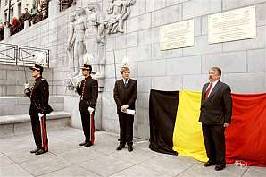 Belgium’s Prime Minister Guy Verhofstadt, 2nd right, and Belgium’s Defense Minister Andre Flahaut, right.
Belgium’s Prime Minister Guy Verhofstadt, 2nd right, and Belgium’s Defense Minister Andre Flahaut, right.Belgian Prime Minister Guy Verhofstadt faced frail men in dark fedoras and children in bright skullcaps Tuesday and apologized for Belgian authorities’ involvement in the deportation of Jews to Nazi extermination camps during World War II.
”Only by recognizing the responsibility of the authorities at the time, can we build a future where this will never happen again,” he told a gathering of Jewish and government officials before unveiling a plaque to commemorate Belgians who saved Jews from the Holocaust.
The apology came on the day that the government-backed report ”Submissive Belgium” was published. It lays bare the responsibility of high-ranking officials and municipalities in collaborating with the Nazi persecution of the Jews.
Verhofstadt said such collaboration extended to many parts of Europe.
”We have to remember that a number – a big number of official people everywhere in Europe in the public administration have collaborated, have worked together with the Nazi regime in the deportation of Jewish people,” he told The Associated Press. ”We have to recognize that and say sorry. Otherwise it is impossible to go forward.”
Some 50,000 Jews lived in Belgium in the 1930s and about half were exterminated in the Holocaust.
”Submissive Belgium” documents how an influx of Jewish refugees from Germany in the 1930s and a swerve to the right in politics created the breeding ground for anti-Semitism and right-wing extremism to take root.
After the Nazi invasion in May 1940, the Belgian government fled to Britain, but issued instructions authorizing civil servants who stayed to work with the Nazis to keep services running and prevent the economic breakdown that occurred during the German occupation in WWI. During the war, it often deteriorated into collaboration with the persecution of Jews.
The Jewish community welcomed Verhofstadt’s move.
”It’s very important for the Jewish community in Belgium to hear these apologies on behalf of the government for what happened in Belgium during the collaboration with the Nazi occupation,” said Rabbi Samuel Pinson of Uccle.
But Senator Alain Destexhe, who attended the ceremony and was involved in the study, said more needs to happen.
”We have to go further in the recognition of what happened in Belgium. We have half of the Jews who were exterminated,” he said, compared to a quarter in neighboring France.
”Our government was officially in London with the Allies, but here the high officials and the municipalities have actively collaborated up to 1942,” before the war turned, he said. ”The young Belgians don’t know this.”
Early in the war, Jewish citizens had to be registered. They were later forced to wear yellow stars, and schools and hospitals were segregated.
”If the Germans told municipalities to draw up lists of Jews or make them wear yellow stars, there often was a bureaucratic zeal to do a good job of it. Within a couple of days the lists were there and the stars distributed,” said Destexhe.
Afterward came the raids to round up Jews who were deported to concentration camps in the east such as Auschwitz.
Verhofstadt, however, offset the dark chapter of his country’s history by lauding Belgians who risked their lives to save Jews from extermination. In all, 1,442 Belgians were recognized by Yad Vashem as Righteous Among the Nations – an honor granted to non-Jews who risked their lives to save Jews during the Holocaust.
The bronze plaques set in gray granite besides Belgium’s main Albertina library commemorate those heroes. Verhofstadt said the path alongside it would be renamed ”Alley of the Righteous.”
